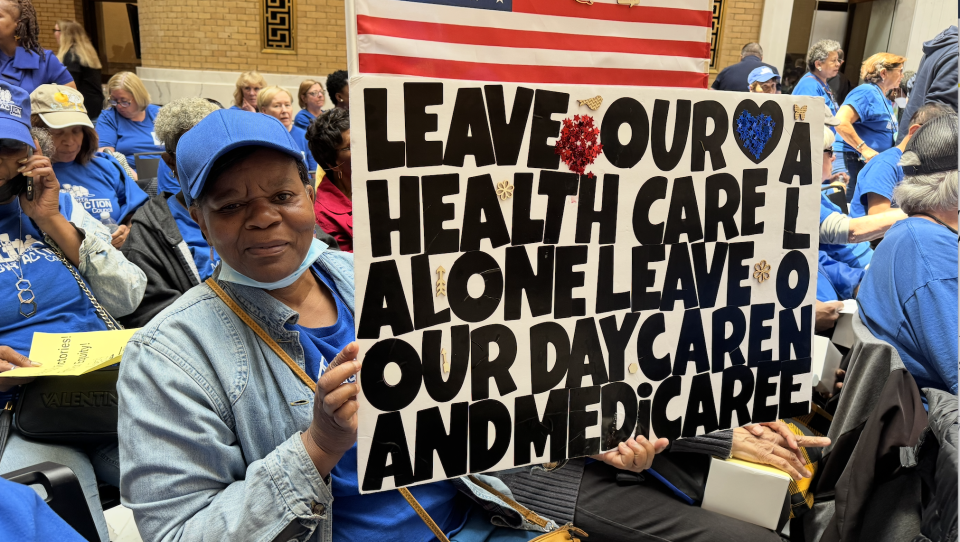Hundreds of seniors from around Massachusetts gathered at the State House in Boston Tuesday to meet with lawmakers and advocate for funding for housing, in-home care, nutrition, mental health and more.
Organizers said the annual Older Adults Lobby Day is more important than ever, amid funding threats to federal programs that support seniors and their caregivers.
Rosa Bentley, president of the grassroots Massachusetts Senior Action Council, said supporting seniors should be a priority to lawmakers. “As the first of the baby boomers turn 80, like me, we know the need for long-term care will continue to grow. We are clear that we want to age in our communities,” she said.
Advocates say home care funding is essential to help seniors avoid nursing homes, which are ultimately more expensive for the state.
Sandra Frechette, CEO of Bristol Aging and Wellness in Fall River, said she is worried about the state’s Home Care Program, which pays for in-home services for seniors that need help. Frechette says that program is underfunded in this year’s budget, putting seniors at risk.
“These people could be their grandmothers or grandparents, brothers, sisters, family members. We really need those funds to keep people at home, to keep them safe, to live at home with dignity instead of going into a nursing home,” she told GBH News.
While many seniors are fighting to stay at home, some are searching for a place to live. State Senator Pat Jehlen noted that the fastest growing group of homeless people are people over 60.
“I know there are people in my district living in the woods, in parking lots,” she said. “We heard testimony from Somerville yesterday that there were over 200 people on the waiting list for senior housing in Somerville. Four got in last year.”
In the coming years, the number of seniors at risk of being homeless will increase significantly, said Rhonda Pieroni, president and CEO of Hearth, Inc. In addition to more affordable housing, Pieroni said the shelter system needs to be more accommodating to seniors and people with disabilities.
“They’re [shelters] not made for older adults,” she said. People who need assistance with “activities of daily living” like bathing, using the bathroom or getting dressed, generally won’t be admitted to a shelter. “There is not the accessibility in the majority of them. So older adults will end up being pushed onto the street.”
Emurriel Holloway, who is 81, came to Boston from Springfield to advocate. She wants more funding for housing, home care and transportation. She doesn’t want seniors to be forgotten in legislation.
“What they [lawmakers] need to know is that seniors are really the backbone of communities. That seniors are very much contributors,” she said.
Last week, Governor Maura Healey signed an executive order that directed state government offices to find ways improve the lives of seniors. Betsey Crimmins, executive director of Mass Aging Access, said that’s the type of local action that they hope for, with uncertainty about what may happen at the federal level.
“Federal cuts to senior nutrition programs, reduction in SNAP benefits, and increasing barriers to access social security assistance are not just policy issues. They are life issues, impacting food security, health, housing stability, and independence,” Crimmins said. “There are a lot of unknowns leaving many older adults anxious and rightly so.”
Do you have a story about caregiving you’d like to share? We would love to hear from you as we continue reporting on this topic. Email equityandjustice@wgbh.org.








